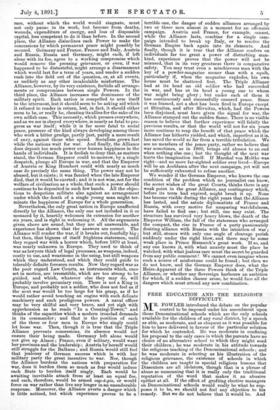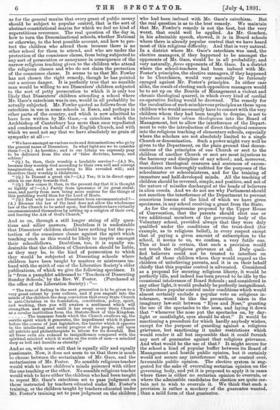FREE EDUCATION AND THE RELIGIOUS DIFFICULTY.
MR. FOWLER introduced the debate on the popular control to be imposed under his amendment upon those Denominational schools which are the only schools available for the children of any rural district, by a speech as able, as moderate, and as eloquent as it was possible for him to have delivered in favour of the particular solution for which he contended. He was moderate in confining his proposal to the only cases in which the parents have no choice of an alternative school to which they might send their children ; he was moderate in his attitude towards the religious teaching of the Denominational schools ; and he was moderate in selecting as his illustration of the religious grievance, the existence of schools in which the children are taught in special religious lessons that Dissenters are all idolators, though that is a phrase of abuse so unmeaning that it is really only the traditional reputation of the word that makes it an abusive epithet at all. If the effect of grafting elective managers on Denominational schools would really be what he sup- poses it to be, we should not feel any objection to his remedy. But we do not believe that it would be. And as for the general maxim that every grant of public money should be subject to popular control, that is the sort of abstract constitutional maxim for which we feel no kind of superstitious reverence. The real question of the day is, how to turn the Denominational schools, whether National or otherwise, to the best possible account, and how to pro- tect the children who attend them because there is no other school for them to attend, and who are under the protection of the conscience clause, from being subjected to any sort of persecution or annoyance in consequence of the narrow religious teaching given to the children who attend the religious classes and who do not claim the protection of the conscience clause. It seems to us that Mr. Fowler has not chosen the right remedy, though he has pointed out a serious danger. It is perfectly true that no sensible man would be willing to see Dissenters' children subjected to the sort of petty persecution to which it is only too likely that Dissenters' children attending a school where Mr. Gace's catechism was in use, would in all probablity be actually subjected. Mr. Fowler quoted as follows from the catechism in use in some schools in Essex, and perhaps in other parts of the country, and which is now admitted to have been written by Mr. Gace,—a catechism which the Archbishop of Canterbury has more than once repudiated and condemned on behalf of the English Church, and with which we need not say that we have absolutely no grain of sympathy at all: a We have amongst us various sects and denominations who go by the general name of Dissenters. In what light are we to consider them ?—(A.) As heretics ; and in our Litany we expressly pray to be delivered from the sins of false doctrine, heresy, and schism.'
" (Q.) Is, then, their worship a laudable service ?—(A.) No, because they worship God according to their own evil and corrupt imaginations, and not according to His revealed will; and therefore their worship is idolatrous.
(Q.) Is Dissent a great sin ?—(A.) Yes; it is in direct oppo- sition to our duty towards God. " (Q.) How comes it. then, in the present day that it is thought so lightly of ?—(A.) Partly from ignorance of its great sinful- ness, and partly from men being more zealous for the things of thisperishing world than for the Lord of Hosts. " (Q.) But why have not Dissenters been excommunicated?— (A.) Because the law of the land does not allow the wholesome law of the Church to be acted upon; but Dissenters have virtually excommunicated themselves by setting up a religion of their own, and leaving the Ark of God's Church.'
And so on, through a still longer string of silly ques- tions and sillier answers. Doubtless it is undesirable that Dissenters' children should have nothing but the pro- tection of the conscience clause against the spirit which teaching such as this would be likely to inspire amongst their schoolfellows. Doubtless, too, it is equally un- desirable that the children of Churchmen should be liable, as they may be, to the kind of persecution to which they would be subjected at Dissenting schools where children have been taught by masters or mistresses im- bued with the spirit of one of the Liberation Society's older publications, of which we give the following specimen. It is "from a pamphlet addressed to Teachers of Dissenting Sunday Schools,' by the Rev. W. Foster. (Purchased at the office of the Liberation Society) : "- " The tone of feeling in the next generation is to be given to a very great extent by your culture, and if you engraft into the minds of the children the deep conviction that every State Church is anti-Christian in its foundation, constitution, policy, spirit, and working, then you will awaken a sentiment which will strengthen and spread until it has swept every State Church as a secular institution from. the Statute-Book of this Kingdom.
The immense funds which the Church swallows up, the servile spirit which it generates, the impediment which it places before the course of just legislation, the barrier which it opposes to the intellectual and social progress of the people, call upon all patriots and philanthropists to labour for its downfall. But all these evils are reduced to insignificance compared with the spiritual mischief which it works on the souls of men—a mischief deep as hell and durable as eternity."
And so on, with more still that is equally silly and equally passionate. Now, it does not seem to us that there is much to choose between the sectarianism of Mr. Gace, and the sectarianism of Mr. Foster. No sensible religious teacher would wish to have children's minds poisoned with either the one teaching or the other. No sensible religious teacher would wish to have either the children who had been taught to repeat Mr. Gate's catechism set to pass judgment on those instructed by teachers educated under Mr. Foster's training, or the children taught by teachers educated under Mr. Foster's training set to pass judgment on the children who had been imbued with Mr. Gace's catechism. But the real question is as to the best remedy. We maintain that Mr. Fowler's remedy is not the best, but the very worst, that could well be applied. As Mr. Goschen, in his admirable speech, showed, it is in Board schools where there is already popular control that we have heard most of this religious difficulty. And that is very natural. In a district where Mr. Gace's catechism was used, the elective managers, if they happened to be amongst the opponents of Mr. Gace, would be in all probability, and very naturally, fierce opponents of Mr. Gace. In a district where the school-teachers had been imbued with Mr. Foster's principles, the elective managers, if they happened to be Churchmen, would very naturally be furiously enraged against Mr. Foster's principles. In either case alike, the result of electing such opposition managers would be to set up on the Boards of Management a violent and chronic theological quarrel, in which every kind of cordial co-operative feeling would be drowned. The remedy for the inculcation of such mischievous principles as these upon children who would necessarily have to consort with the very children whom they had been taught to despise, is not to introduce a bitter odivina theologicum, into the Board of Management, but to allow the interference of the Depart- ment to veto the introduction of direct theological censures into the religious teaching of elementary schools, especially. -where the scholars are not absolutely limited to a single Church or denomination. Such a power might very well be given to the Department, on the plain ground that denun- ciations of the principles of one Church or sect to the children of another Church or sect are most injurious to the harmony and discipline of any school; and, moreover, that direct theological censures and sentences of excom- munication are thoroughly unfitted for the purposes of the schoolmaster or schoolmistress, and for the training of immature and half-developed minds. All the teaching of children should be reverent, simple, and positive, and not of the nature of missiles discharged at the heads of believers in alien creeds. And we do not see why Parliament should not sanction the interference of the Department to prevent censorious lessons of the kind of which we have given specimens, in any school receiving a grant from the State. As for the compromise proposed by the Upper House of Convocation, that the parents should elect one or two additional members of the governing body of the Voluntary school, provided always that they were duly qualified under the conditions of the trust-deed (for example, as to religious belief), in every respect except that of paying a given amount of subscription to the school, it seems to us, we confess, a very futile one. This at least is certain, that such a provision would. not touch the religious grievance at all. Duly quali- fied believers could not be trusted to interfere on behalf of those children whom they would regard as the children of unbelieving parents, and it is on their behalf chiefly that this popular control is advocated. Considered as a proposal for securing religious liberty, it would be perfectly idle, and indeed has been proved to be idle by the occasional intolerance of Board Schools ; and considered in any other light, it would probably be perfectly insignificant. To introduce popular control under conditions which would almost certainly exclude a popular veto on religious in- tolerance, would be like the precaution taken in the imaginary law-suit between " Eyes and Nose," granting the use of the spectacles to the nose, and laying it down that " whenever the nose put the spectacles on, by day- light or candlelight, eyes should be shut." It would be sanctioning a. procedure for .which hardly anybody wishes, except for the purpose of guarding against a religious grievance, but sanctioning it under restrictions which would render it all but impossible that it could furnish any sort of guarantee against that religious grievance. And what would be the use of that ? It might secure for the school a kind of popular buffer between its Board of Management and hostile public opinion, but it certainly would not secure any interference with, or control over, favourable public opinion. The elective system is sug- gested for the sake of overruling sectarian opinion on the governing body, and yet it is proposed to apply it in cases where there is either no sectarian opinion to overrule, or where the admissible candidates for election are quite cer- tain not to wish to overrule it. We think that such a provision is rather a mockery of the guarantee wanted, than a mild form of that guarantee.











































 Previous page
Previous page